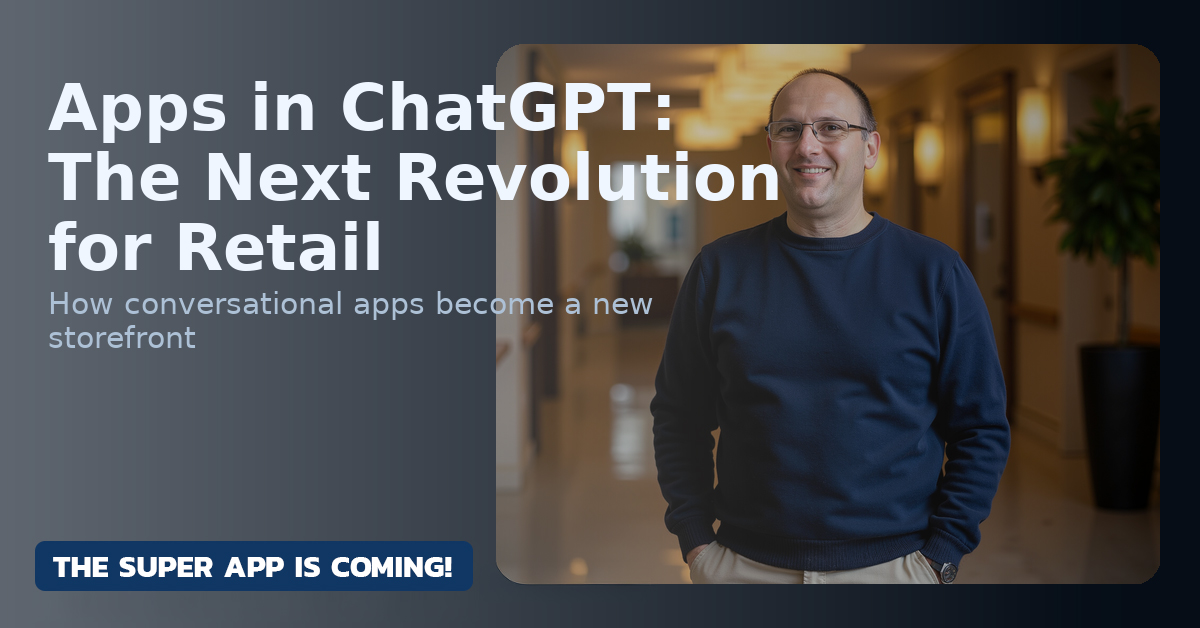
On October 6, 2025, OpenAI introduced apps inside ChatGPT, tools you can literally chat with. It sounds simple, but the idea is profound. This is a credible path to a super-app: one conversational interface where customers can search, compare, design, book, and soon, buy, without leaving the chat.
What’s new
Developers can build and deploy apps that run inside ChatGPT. Today the catalog is small (e.g., Booking.com, Canva, Coursera, Expedia, Figma, Spotify, Zillow), with another wave announced (AllTrails, DoorDash, Instacart, Khan Academy, OpenTable, Peloton, Target, The Fork, TripAdvisor, Thumbtack, Uber). For now, availability is limited: English only, not yet in the EU, Switzerland, or the UK, and third-party submissions aren’t open for review just yet. But the Apps SDK is live (read more)., the Model Context Protocol (MCP) connects ChatGPT to external systems (read more), and an agentic commerce protocol is planned to enable checkout inside ChatGPT (read more). OpenAI also signaled that monetization for apps is coming—another growth accelerant.
Why this is a big deal
We’ve heard “super-app” talk before (WeChat, X). The difference now is that any developer can ship focused, high-value tasks into a surface used by hundreds of millions of people. Expect a rapid expansion from a handful of integrations to hundreds of apps, making ChatGPT a mainstream retail surface.
From my point of view, several factors will drive this concept’s success:
- Natural interaction. You use plain human language to “talk” to apps. It’s easy, intuitive, and already familiar to anyone using AI today.
- Built-in audience. ChatGPT reports ~800M weekly active users, a massive base new apps can tap into.
- Commerce primitives. Core features like shopping and payments are already on the roadmap or in place.
- First-mover edge. Early entrants will shape patterns, earn invocation priority, and learn fastest.
- Monetization coming. A formal revenue model will attract serious builders and sustained investment.
How this reshapes retail
1) A new discovery & conversion channel (beyond SEO).
ChatGPT can invoke a retailer’s app, render results, and guide next steps, reducing hops to websites and native apps. Expect intent to be routed to the best matching app, where quality, metadata, and past performance determine who gets called. In practice, ChatGPT becomes a new node in your omnichannel mix.
2) Agentic commerce becomes practical.
“Show me a black waterproof parka under €200 in size M—buy it.” The assistant will orchestrate tasks across multiple apps. Retailers with clean inventory, price, delivery, returns, and tax APIs will win more of these flows. Convenience usually wins—expect a shift in purchase behavior.
3) Product data turns machine-first.
Rich, structured feeds (attributes, availability, tax, warranty, sustainability) beat glossy prose. Think SEO for AI: precise schemas, deterministic answers, and up-to-date stock.
4) Loyalty & identity move to the side-car.
Apps can prompt customers to connect accounts and share data in context. That can personalize results instantly, but it also means some customer signals will live first in ChatGPT. Retailers will need partnership models to maximize value while protecting data and trust.
5) Store ops & service get a new front door.
Order status, exchanges, warranty actions, and returns can be resolved inside ChatGPT, pulling from your systems with audit trails. Expect deflection from call/chat centers, and a rethink of the many standalone chatbots running on retailer sites.
6) Compliance & trust by design.
Transparent consent prompts, region-aware policies (e.g., GDPR), logging, and tax/fiscal correctness for agent-initiated purchases (VAT display, e-receipts, returns logic) must be deterministic and auditable. Regulators will pay attention, be ready.
What retailers and POS vendors should do now
- Expose stable APIs for products, prices, inventory, delivery ETAs, returns, and loyalty. Add webhooks to keep results fresh.
- Prepare agent-ready content: concise spec sheets, comparable attributes, policy snippets (returns, VAT), sustainability facts, structured, not prose.
- Build 1–2 focused ChatGPT apps with the Apps SDK (e.g., “find & reserve nearby,” “size/fit concierge,” “bundle builder,” “warranty/exchange”). Keep scope tight and outcomes crisp to help the model route to you.
- Plan governance: who owns the app, who updates descriptions, who approves data scopes, who monitors outages and response times.
- Instrument outcomes: track invocation rate, task completion, conversion, freshness errors, P95 response time, CSAT, and return rates.
Strategic takeaway
OpenAI’s Apps SDK effectively adds a new storefront where conversation is the UI. Retailers that treat this as a first-class channel, clean APIs, structured data, precise tasks, measurable outcomes, will earn early share. Those who wait will watch assistants default to better-prepared competitors. The moment to ship something small, learn fast, and iterate is now.

